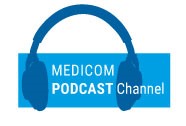Around 30% of COVID-19 survivors manifest with cognitive disturbances and 30–40% with psychopathological disorders. It is still unclear whether these disturbances persist after COVID-19 infection. An Italian study set out to explore psychopathological features within 2 months (subacute phase) and 10 months (post-COVID-19 phase) after hospital discharge in a cohort of 49 subjects with confirmed COVID-19. Participants underwent comprehensive neuropsychological assessment and a brain MRI within 2 months from hospital discharge; age range was 40–75 years. Prof. Federica Agosta (Vita-Salute San Raffaele University, Italy) presented the results.
In the subacute phase, 53% of participants had ≥1 cognitive deficit. Domains affected the most were executive functions (39%), memory (6%), visuospatial functions (6%), and non-executive functions (2%). Also, 16% had depressive symptoms and 18% reported post-traumatic stress disorder (PTSD). Lower performance at information processing was associated with higher severity of respiratory COVID-19 symptoms (r=0.44; P=0.002). Lower performance on memory tests was associated with more white matter brain lesions. Cognitive and psychopathological problems were more severe in younger people, with most patients aged <50 having executive dysfunctions. In the post-COVID-19 phase, at 10 months of follow-up, the percentage of patients with cognitive deficits decreased from 53% to 36%. The incidence of depression and PTSD did not change.
- Agosta F, et al. Cognitive and behavioral features of a cohort of patients in COVID-19 post-acute phase. EPR-067, EAN 2021 Virtual Congress, 19–22 June.
Copyright ©2021 Medicom Medical Publishers
Posted on
Previous Article
« Stroke with covert brain infarction indicates high vascular risk Next Article
Intracerebral haemorrhage only slightly increases mortality in COVID-19 patients »
« Stroke with covert brain infarction indicates high vascular risk Next Article
Intracerebral haemorrhage only slightly increases mortality in COVID-19 patients »
Table of Contents: EAN 2021
Featured articles
Letter from the Editor
COVID-19
First evidence of brainstem involvement in COVID-19
Cognitive/behavioural alterations persistent after COVID-19
Neural base of persistent hyposmia after COVID-19
Neurological symptoms and complications of COVID-19 affect outcomes
Cerebrovascular Disease
Intracerebral haemorrhage only slightly increases mortality in COVID-19 patients
Stroke with covert brain infarction indicates high vascular risk
Expanding precision medicine to stroke care
Dexamethasone not indicated for chronic subdural haematoma
Cognitive Impairment and Dementia
Severe outcomes of COVID-19 in patients with dementia
Promising diagnostic accuracy of plasma GFAP
Sex modulates effect of cognitive reserve on subjective cognitive decline
Hypersensitivity to uncertainty in subjective cognitive decline
Epilepsy
Minimally invasive device to detect focal seizure activity
‘Mozart effect’ in epilepsy: why Mozart tops Haydn
Migraine and Headache
Factors associated with decreased migraine attack risk
Pregnant migraine patients at higher risk of complications
Occipital nerve stimulation in drug-resistant cluster headache
Rhythmicity in primary headache disorders
Multiple Sclerosis and NMOSD
Typing behaviour to remotely monitor clinical MS status
Alemtuzumab in treatment-naïve patients with aggressive MS
No higher early MS relapse frequency after stopping ponesimod
Good long-term safety and efficacy of inebilizumab in NMOSD
Neuromuscular Disorders
Inability to recognise disgust as first cognitive symptom of ALS
Pathogenic T-cell signature identified in myasthenia gravis
Parkinson’s Disease
Levodopa-carbidopa intestinal gel in patients with advanced PD
New Frontier – Navigated Transcranial Ultrasound
Exploring the possibilities
Related Articles
August 18, 2021
Hypersensitivity to uncertainty in subjective cognitive decline

July 9, 2021
EAN 2021 Highlights Podcast
August 18, 2021
Good long-term safety and efficacy of inebilizumab in NMOSD
© 2024 Medicom Medical Publishers. All rights reserved. Terms and Conditions | Privacy Policy
HEAD OFFICE
Laarderhoogtweg 25
1101 EB Amsterdam
The Netherlands
T: +31 85 4012 560
E: publishers@medicom-publishers.com

